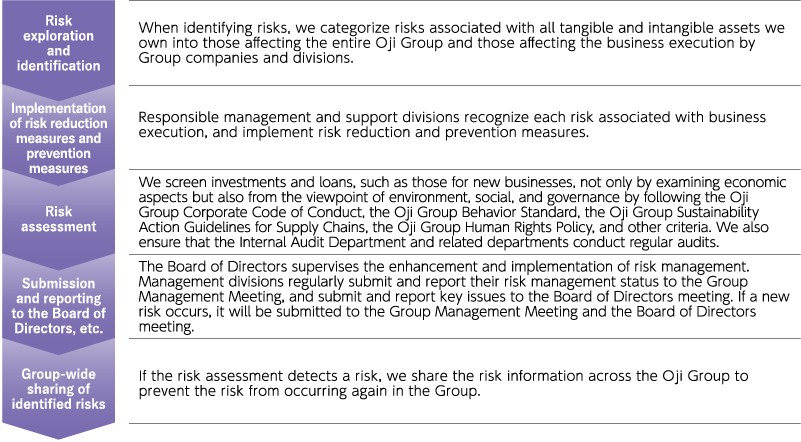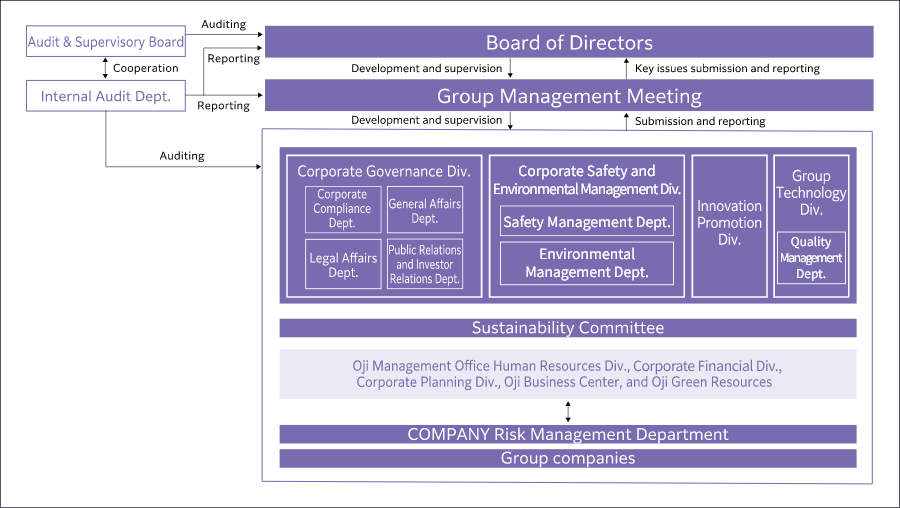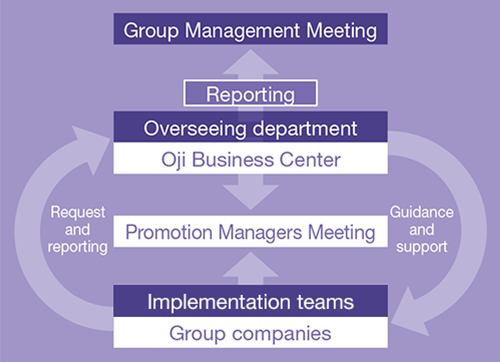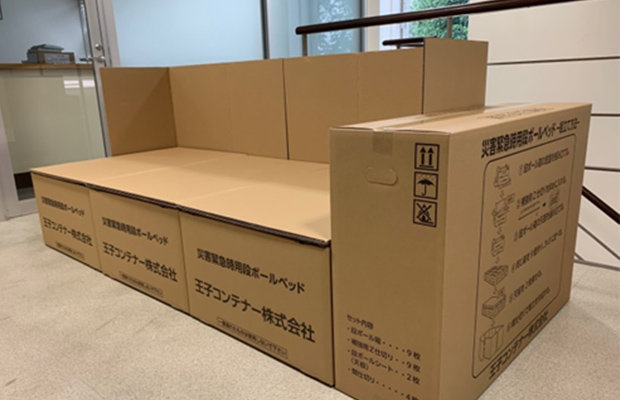Risk Management Framework and System
The Oji Group undertakes its business activities with the high ethical standard laid out in the Oji Group Corporate Code of Conduct, and implements appropriate risk management practices. In response to the rapid expansion of the areas in which we operate businesses, we will reinforce our risk management structure globally to ensure business continuity and the steady development of our businesses.
Developed by the Oji Group under the supervision of the Board of Directors, the Oji Group has established Group Risk Management Regulations and it works to manage risks in the flow described below.
The Directors and Corporate officers of Oji Holdings are responsible for reporting risks in the businesses and divisions under their control to the Group Management Meeting, and important risks are also reported to the Board of Directors.The Oji Holdings Board of Directors reviews the effectiveness of its risk management process annually.

The Oji Group's risk management system is structured as shown in the diagram below and operates separately from the Audit & Supervisory Board and the Internal Audit Department.
The Audit & Supervisory Board and the Internal Audit Department also audit the status of risk management.

The Oji Group identifies major risks that may have a material effect on its financial position, etc., and categorizes them into three groups: risks regarding long-term issues, risks associated with its management strategies, and risks arising from the execution of business.
| Type of risk | |
|---|---|
| Risks regarding long-term issues |
Climate change |
|
Pandemic |
|
| Risks associated with our management strategies |
Structural changes in demand arising from innovation |
|
Fluctuations in demand |
|
|
Fluctuation of global market conditions |
|
|
Domestic business |
|
|
Overseas business |
|
| Risks arising from the execution of business |
Occurrence of disasters, etc. |
|
Laws, regulations and other rules |
|
|
Litigations and other actions |
|
|
Product liability |
|
|
Exchange rate fluctuations |
|
|
Interest rate fluctuations |
|
|
Information leakage |
Please refer to “Section 2: Business Overview – 3. Business Risks” in the Securities Report(in Japanese Only) for details on major risks and Main countermeasures against risks.
Information Security Measures
The Oji Group positions information obtained through its business activities as important assets. We have enacted Information Systems Usage and Risk Management Regulations to respond promptly to changes in the IT environment which is always becoming more complex, and we have established a groupwide system to prepare for cyber threats such as unauthorized access to systems and disasters. The Oji Business Center, as a department that oversees our information system risk management, inspects the information system risks throughout the Group and maintains, manages and improves IT security. In addition, it regularly provides educational activities and information on the latest risk trends that it had acquired to employees using company newsletters and conducts targeted email training so that employees can handle phishing e-mails which are becoming more sophisticated every day. In FY2021, we revised regulations to respond to the changes in work styles, such as the increased use of cloud computing and teleworking during the COVID-19 pandemic. We will work to make sure that these measures take hold and further strengthen our efforts to improve IT security from a global perspective.

BCP
At the Oji Group, we have formulated a BCP*1 for each COMPANY to respond to an emergency when a risk associated with the execution of business materializes. Reviewing the BCPs as necessary, we also engage in BCM.*2 In the event of a serious incident that must be addressed by the Group as a whole, we establish a Group Emergency Headquarters to confirm the safety of employees, investigate the damage incurred, and take prompt measures to continue supplying products to our customers.
- *1 A business continuity plan (BCP) is a plan for continuing business in an emergency such as a disaster or pandemic.
- *2 Business Continuity Management (BCM) is comprehensive and integrated management for ensuring business continuity, including the formulation and continual improvement of BCPs including, for example, the introduction, implementation and review of BCPs.
Building a Group Disaster Control System
We have established the Group Disaster Control Office as a permanent organization to prepare for disasters such as fires, earthquakes, storms and floods. We have formulated rules on the reporting of disaster and accident information, establishing a system that enables us to promptly obtain the most up-to-date information. We also promptly share information on disasters that have occurred within the Group for the implementation of recurrence prevention measures. By holding regular Disaster Prevention Committee meetings and conducting a large-scale safety confirmation drills using the safety confirmation system and disaster prevention drills at each workplace, we work to increase employees’ awareness of disaster preparedness and strengthen disaster preparedness measures.
Locating production bases to diversify risks and flexibly procure raw materials
Oji Group companies have production bases nationwide, from Hokkaido to Kyushu. While proceeding with the consolidation of production bases to enhance competitiveness, we consider risk diversification in the continuation of our business. In addition, to ensure we are able to continue production, we, in principle, procure raw materials from several companies and ensure we are able to flexibly procure materials from diversified sources.
Exploration of infrastructure risks and implementation of measures
The production bases of the Oji Group in Japan explore risks related to earthquakes, heavy rains, typhoons and other natural disasters, and implement measures against them using local hazard maps to simulate the occurrence of disasters such as floods or landslides. For example, we have strengthened waterproofing measures for electrical rooms to prevent the long-term stoppage of operations at plants or mills. We also actively roll out useful measures to other companies in the Group.
Local preparedness for natural disasters and support
In recent years, we have strengthened not only the measures within the Group but also our collaboration with local residents to prepare for the increasingly frequent natural disasters. To date, we have concluded a total of 170 disaster prevention agreements with local governments across Japan. When a disaster occurs, we provide corrugated cardboard beds and various other types of corrugated cardboard products, and also jointly conduct drills for setting up evacuation centers. We provide support in a wide variety of ways, including infection prevention measures.
The Oji Group carries out its production activities to maintain people’s everyday lives around the world by supplying the corrugated containers and folding carton products that support logistics services, hygiene materials such as tissue paper, toilet roll and face masks, as well as printing and communication paper that conveys information.

